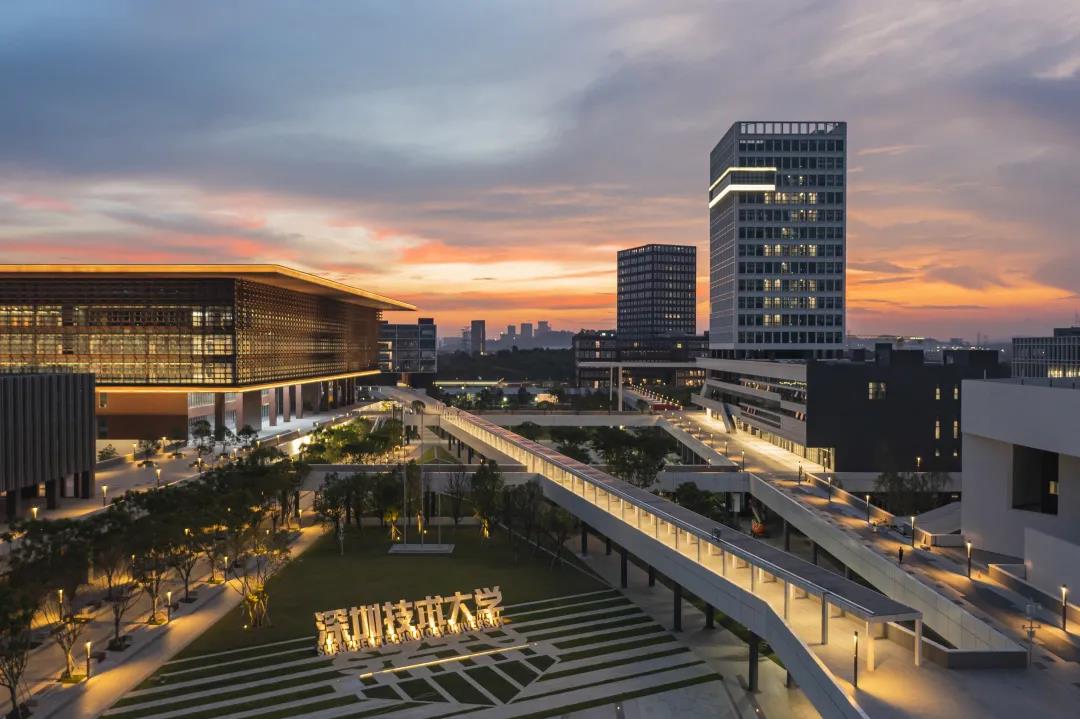Over the past three years, the footsteps of students from Shenzhen Technology University (SZTU) exploring the world have slowed down. However, this summer, SZTU has provided abundant opportunities for overseas learning and exchange, and students are now restarting their suspended journeys and exploring the world. Organized by the International Cooperation and Student Affairs Office, eight summer student groups consisting of more than 130 students are embarking on their study journey in Germany, Singapore, Australia, and South Korea. This enriching experience allows them to feel the world, learn cutting-edge knowledge, and broaden their horizons.
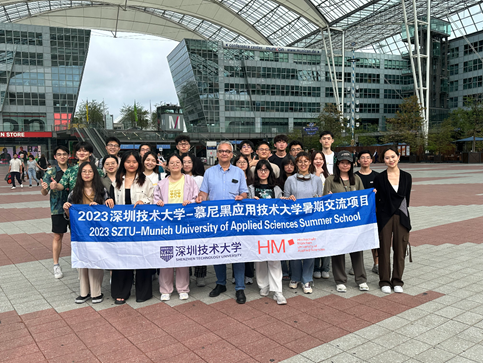
Prof. Martin Renner welcomes the students at the airport. [Photo/International Cooperation & Student Affairs Office]
On July 16, 21 students from various colleges of SZTU, including the College of Urban Transportation and Logistics, Sino-German College of Intelligent Manufacturing, College of Big Data and Internet, College of Health Science and Environmental Engineering, School of Design and Innovation, College of New Materials and New Energies, College of Engineering Physics and College of Pharmacy, arrived at Munich International Airport, symbolizing the start of a two-week Summer School at Munich University of Applied Sciences (MUAS) on “Industry 4.0”. Upon arrival, the friendly and warm-hearted Prof. Martin Renner and one tutor welcomed them at the airport. Prof. Renner greeted each student with a smile and handshake. On their way to the hotel, he had warm conversations with our students, and he introduced them to the public transportation culture in Germany.
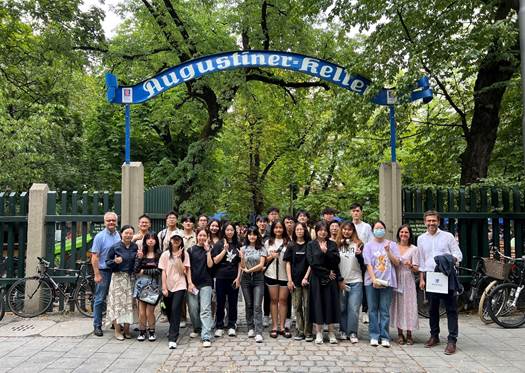
The students are warmly welcomed. [Photo/International Cooperation & Student Affairs Office]
In the evening, Prof. Martin Renner, Prof. Mathias Gabrysch, and Ms. Gabriela Vasil from the International Office warmly welcomed SZTU students and invited them to taste traditional German cuisine and beer. Excited and filled with anticipation, our students exchanged ideas with each other and looked forward to their upcoming journey in Germany.
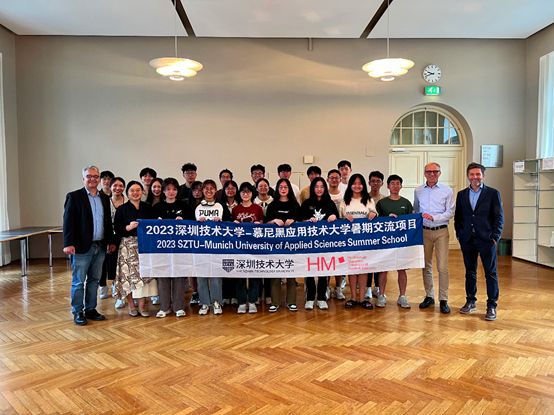
A welcome ceremony is held for SZTU students. [Photo/International Cooperation & Student Affairs Office]
On the morning of July 17, MUAS held a warm welcome ceremony for our students, attended by Vice President Prof. Klaus Kreulich, Prof. Martin Renner, and Prof. Mathias Gabrysch. Prof. Kreulich delivered a welcoming speech, recalling the scenes of SZTU students participating in the first “Industry 4.0” Summer School in July 2018. The programme was tailored specifically for the SZTU students, and he hoped that our students would have two fulfilling weeks in Munich. Prof. Kreulich introduced the city of Munich, MUAS, and its international cooperation, and shared the exciting news that MUAS was approved to award doctoral degrees. Prof. Mathias Gabrysch explained the schedule and assessment requirements of the programme to students.
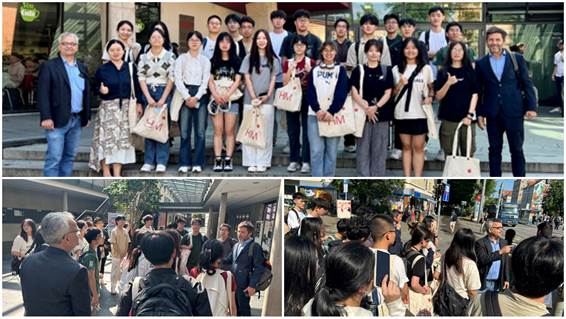
Students have a campus tour at MUAS. [Photo/International Cooperation & Student Affairs Office]
Subsequently, Prof. Martin Renner and Prof. Mathias Gabrysch led the students on a campus tour of the teaching buildings and library of MUAS. During lunchtime, Vice President Prof. Kreulich accompanied the students at the school cafeteria.
Under the theme of “Industry 4.0,” the courses mainly include German culture, German innovation, disruptive innovation technology, intelligent manufacturing and automation, intelligent robotics, smart cities and architecture, as well as practical training in the “Industry 4.0” laboratory.
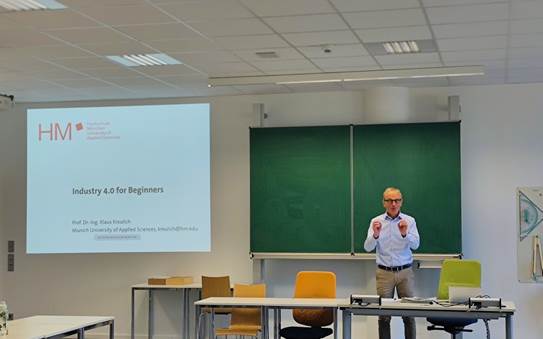
Lesson: Industry 4.0 [Photo/International Cooperation & Student Affairs Office]
The students had their first lesson on “Industry 4.0” with Vice President Prof. Kreulich, where they learned about the different stages of industrial revolution, the technological driving factors and challenges of “Industry 4.0,” current applications of “digital twins” in various industries, and the analysis of information coding technology. The course was logically structured and presented in an easy-to-understand manner, incorporating videos, industry reports and interactive games to give students a comprehensive understanding of “Industry 4.0”.
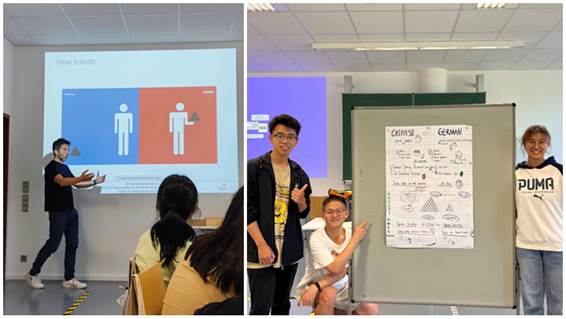
Lesson: German Culture and Workplace [Photo/International Cooperation & Student Affairs Office]
As first-time visitors to Germany, it was essential for the students to quickly adapt to local customs and understand German culture. In the course German Culture and Workplace, Prof. Mathias Gabrysch employed an exploratory teaching approach, allowing students to work in groups to express their understanding of Chinese and German cultures through words or graphics. Furthermore, Prof. Gabrysch led discussions on cultural concepts, German cultural characteristics, and an analysis of the features of one country’s culture using theoretical models. Students expressed that they gained a deeper understanding of German culture, and learned about the German people’s punctuality, orderliness, well-organized personalities, and strong planning skills.
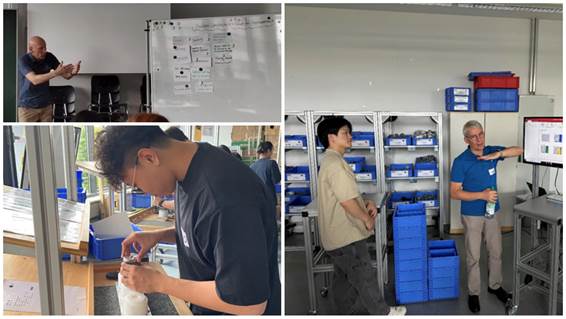
Practical course “Manufacturing and Automation: Leans meets Digital” [Photo/International Cooperation & Student Affairs Office]
“The German classroom emphasizes group collaboration, both in class and in simulated workshops. German professors emphasize the concept of ‘You are a team! Just work tightly!’”, said Yan Kaitian from College of Health Science and Environmental Engineering. According to Yan, the practical course “Manufacturing and Automation: Leans meets Digital” enlightened them on some basic knowledge. For example, an assembly line producing a product requires the cooperation of eight departments, including parts sorting, product assembly, quality testing, and packaging, with each part being indispensable. In order to produce as many products as possible within a limited time, close collaboration within the group and mutual assistance are crucial. Members learn from each other, complement each other’s strengths and weaknesses, and optimize resources to achieve goals more efficiently. During the group collaboration, everyone strives towards the same goal and independently explores the unknown, all in a relaxed and pleasant atmosphere.
After class, there was group self-study and learn diary sessions. Students finished their learning diaries in groups to digest and understand the content they learned each day, internalizing and forming their thoughts and perspectives. Two tutors from MUAS helped students complete their diaries every day.
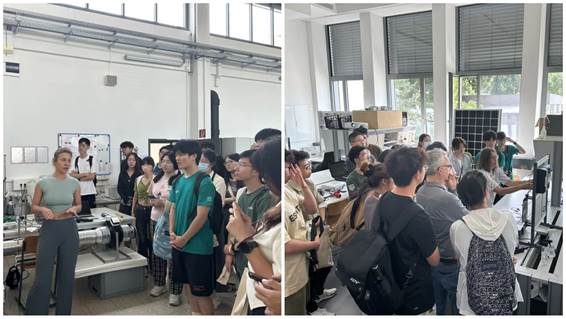
Students visit laboratories at Augsburg University of Applied Sciences. [Photo/International Cooperation & Student Affairs Office]
On the morning of July 19, our students visited one of our partner universities, Augsburg University of Applied Sciences. They took a class in a renewable energy laboratory led by Prof. Christine Schwaegerl, gaining a lot of new knowledge in the field of new energy. Afterwards, they visited the Energy and Process Manufacturing Laboratory and learned about renewable energy research from a Czech doctoral student Dominika Babička Fialová.
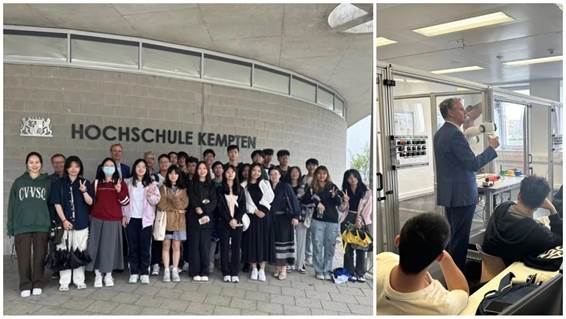
Students visit Kempten University of Applied Sciences. [Photo/International Cooperation & Student Affairs Office]
On July 25, the students went to the KUKA Robotics Lab at Kempten University of Applied Sciences for the Intelligent Robotics course taught by Vice President Prof. Jacob Dirk. Prof. Dirk presented various application cases and videos of robots in different fields during the class. He demonstrated the manufacturing principles through on-site operation of the KUKA robot, and they learned about the cutting-edge applications of “Industry 4.0” in intelligent robotics. After the class, Prof. Dirk and Bernd Holzhauser, head of International Office, joined the students for lunch in the school cafeteria.
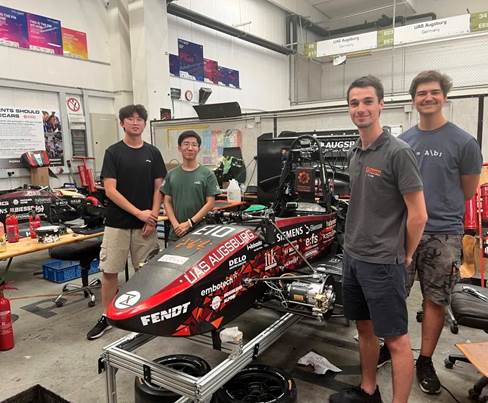
Students from the SZTU Racing Car Studio have in-depth exchanges with German students. [Photo/International Cooperation & Student Affairs Office]
In addition to the academic endeavors, two of our students, Wu Hao and Mai Haojun from the College of Urban Transportation and Logistics, who are also members of the SZTU Racing Car Studio, took the initiative to visit the racing team of Augsburg University of Applied Sciences and Munich University of Applied Sciences during their stay in Germany. They had friendly exchanges and discussions on racing knowledge with German students. Mai Haojun said, “We had in-depth discussions with German students on mechanical transmission and automotive electronics. During the discussions, I was impressed by the professionalism and rigorous work attitude of the German students.”

Students visit MAN Bus & Truck. [Photo/International Cooperation & Student Affairs Office]
On the morning of July 20, our students went to MAN Bus & Truck for research and study, experiencing the meticulous craftsmanship and spirit of excellence in German companies. They were deeply impressed by the innovative design, excellent performance, and environmentally friendly green technology. Founded in 1758, MAN has a history of over 260 years and is one of the leading companies in Europe’s mechanical and vehicle manufacturing industry. Its product range covers trucks, special vehicles, city buses, luxury cars, high-end engines, and vehicle components. Its production bases and service networks are spread throughout the world.
The employees vividly introduced the company in the auditorium and led everyone to the factory for close observation. Under the full explanation of the guide, the students went into the vehicle production plant, observing the entire process from components selection, core parts manufacturing, engine installation, and final assembly to testing. They learned about the practical application of lean production through the use of 5S, Kanban, JIT, and visual management to achieve a balance between efficiency and quality. They gained a more intuitive understanding of the manufacturing process, quality control, production management, and performance testing.

Students visit BMW World and Museum. [Photo/International Cooperation & Student Affairs Office]
On the morning of July 23, our students had the opportunity to visit the famous BMW World and Museum. This on-site visit further integrated the knowledge they learned and helped them understand the humanized management of German companies, experiencing the ingenuity and meticulousness of German manufacturing. They were very grateful for the unforgettable experience and valuable learning opportunities during their stay in Germany.
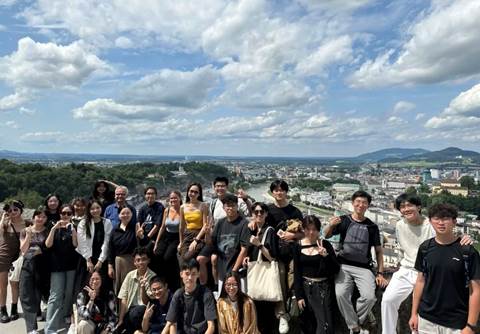
Students explore the German culture during their stay. [Photo/International Cooperation & Student Affairs Office]
This learning journey also served as a cultural experience. Amidst the tight study schedule, the SZTU-MUAS Summer School also organized cultural exploration activities, allowing students to explore Munich and surrounding cities, participate in exciting cultural activities, and appreciate the unique historical and cultural charm of Germany. They also gained insights into local socio-economic development, providing them with impactful and brand-new experiences.
Munich University of Applied Sciences (MUAS) is one of the largest universities of applied sciences in Munich, Germany. Established in 1971, it is one of the most important institutions for applied sciences and engineering in Munich and is also highly regarded as one of Germany’s leading universities of applied sciences. MUAS offers a wide range of disciplines, including engineering, information technology, business, social sciences, design and health sciences. SZTU and MUAS signed a Memorandum of Understanding in 2017 and have maintained long-term and sound cooperation and exchanges. In 2018 and 2019, SZTU sent students to MUAS for the summer school program for two consecutive years, which was well-received by our students.
Drafted by Emily(文佩玲)/ International Cooperation & Student Affairs Office
Revised by International Cooperation & Student Affairs Office
Edited by International Cooperation & Student Affairs Office
